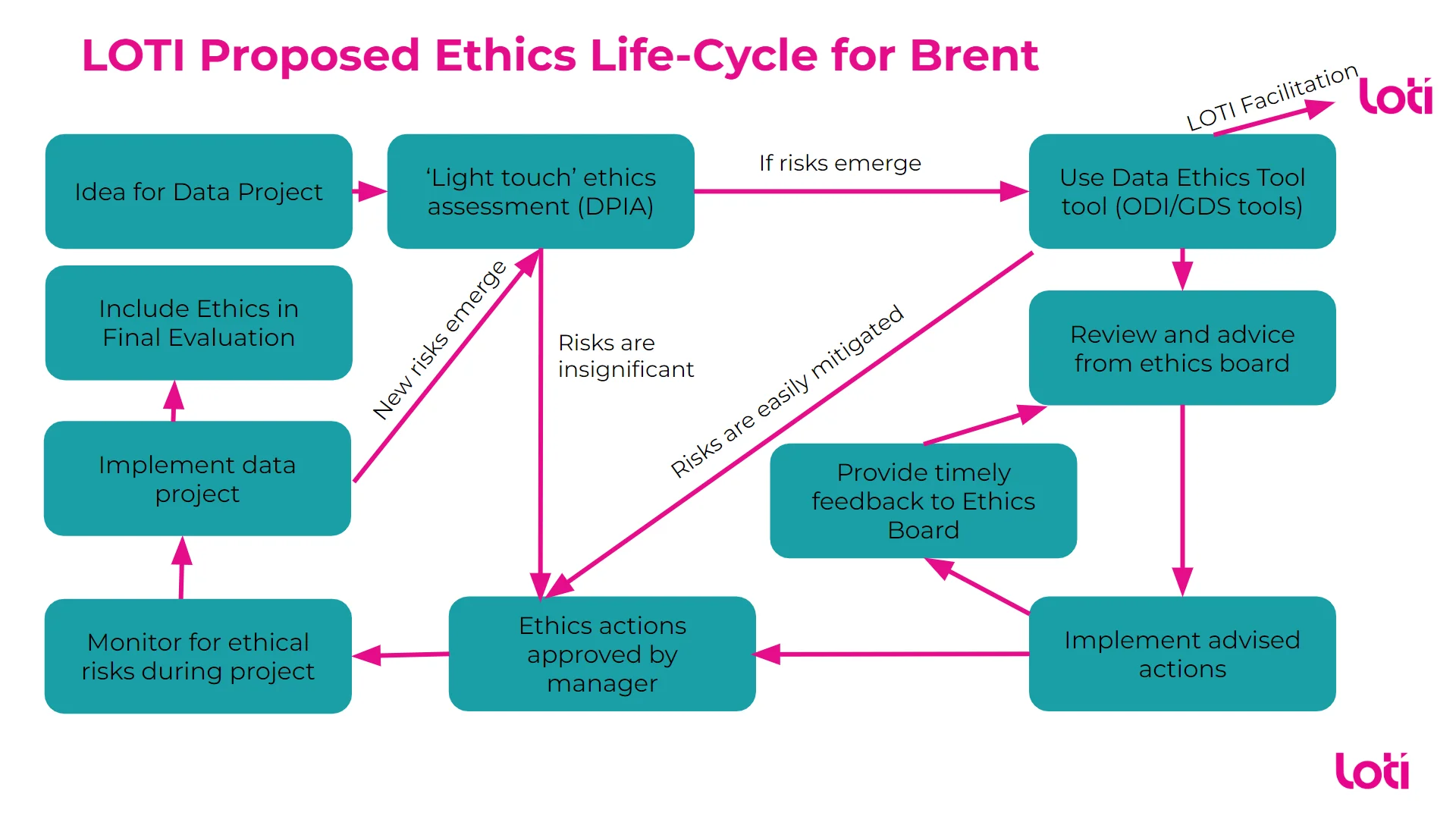Learning from Brent’s Data Ethics Board
In 2021, Brent Council demonstrated their commitment to data ethics by creating a Data Ethics Board, which LOTI was able to help in the development of. Off the back of that, we created a resource pack to guide any other local government organisations who might want to create their own Ethics Board. One year after the board’s creation, Brent came to LOTI to reflect on the board’s activities, and most importantly, to hear any recommendations for how the board might develop moving forwards.
This was a great learning opportunity both for Brent, to understand areas where they might develop to ensure their board is delivering the best value it cant, and for LOTI, to understand good and best practices so we can help other boroughs who might be interested in implementing a data ethics board – important because creating such a data ethics board was one suggested recommendation in LOTI’s Recommendations for Data Ethics Capabilities for Local Government.
To understand what Brent’s board had achieved and where they might go next, I looked at internal documents about the board (including minutes, membership, its recommendations that it gave to projects), interviewed project managers who had taken projects to the board, and also analysed other data ethics boards from the public sector and beyond. Below are some of what I found and proposed for Brent.
Delivering on its promises
Above all, I found that the ethics board was succeeding in delivering on all of its proposed actions in its Terms of Reference. This was highly commendable and showed how the organisers of the Board were sincerely committed to doing data ethics right, along with the fact that the board was having appropriate conversations and making appropriate recommendations.
There were a few particular recommended actions that the board proposed, which I liked that I wanted to share:
- One recommendation the board gave asked that front-line staff be consulted to assess both negative and positive feedback from residents on views about joined up databases.
- Another recommendation asked the project managers to validate current AI informed decisions against historic non-AI informed decisions.
- Lastly, another asked for a guidance document to be created which detailed how AI decisions are made to reduce hesitation of their use, which would be an invaluable resource for Brent.
Embedding Ethics in the Organisation
One proposal was to ‘close the loop’ with the recommendations that the board were giving to projects. Excellent discussions and proposed actions were coming out of the board, but the board wasn’t getting feedback from the projects that it was considering. Therefore, we proposed that projects give timely feedback to
Further, as the board is only advisory, it became clear that Brent might also want to develop some internal accountability to an appropriate management position to complement the board. As one board member pointed out, it is also important that ethical risks are monitored and managed after a project has been implemented, so such an accountability to an internal position would help with that.
To understand what these developments might look like in a whole lifecycle of a particular data project, LOTI created the below ‘process flow’ to understand the different stages.

Communication of the Board
One area where Brent could develop its board further was around communication and transparency. Internally, project managers said that they hadn’t seen many internal communications about the board since it was created. Externally, Brent hadn’t published anything online about the ethics board, except via the LOTI website. Whilst it doesn’t necessarily affect the quality of discussion and advice that the board was providing, we pointed out that Brent might want to communicate information about the board both internally and externally a bit more openly. This would help develop an organisational culture around ethics and also demonstrate the council’s commitment to its residents to use their data responsibly.
Board Membership
Lastly, Brent’s ethics board is a hybrid of internal and external members. Its external members are experts from academia and other public sector roles, and its internal members come from other areas in the organisation. In terms of external members, LOTI proposed adding a private sector representative, as other public sector ethics boards had.
In terms of internal membership, it was good to see Brent having people from non-digital teams present, which some mature private sector organisations also do. My only suggestion came from Public Digital, where whenever they have a team member with lived experience relating to a project being discussed, they are invited to join their ethics review panel so their lived experience can inform conversation. In a council this might mean, for example, people who accessed a particular social service invited to join a meeting where a data innovation relating to that service is discussed.
Following a good discussion of our findings and proposals at the Brent ethics board, Brent are now looking at how they can continue to develop the board and their ethics capabilities, as they gain more experience working on the topic.
If you are interested in incorporating data ethics capabilities into your organisation, like Brent’s data ethics board, and want LOTI guidance or help piloting or evaluating your steps, please reach out to myself (sam.nutt@loti.london) and Jay Saggar (jay.saggar@loti.london).
Sam Nutt


